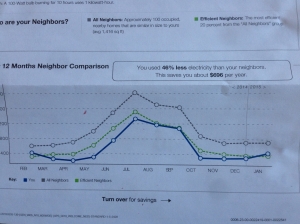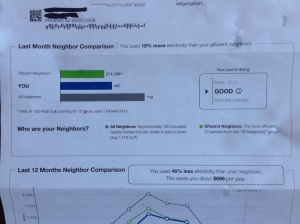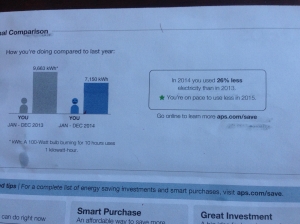I hate spending money on utilities. I feel like I get nothing out of them, so I try to cut as much as I can. Living in AZ it’s a different cycle than most of the country. Our utility bills drop off the map during the winter months and skyrocket during the summer. You can pretty much count on running your air conditioning 24/7 from May through most of September, however late Fall through Winter it could be as low as one-fifth of a typical summer month’s bill.
I tend to run my AC less than most and keep the thermostat higher in the house during the summer months. I “cool” the house to about 82 degrees during the summer months. To most people that would be insane, but when you’re walking in from 110 it makes quite a difference. I keep ceiling fans running in all the rooms and it helps to provide a breeze too. When I tell locals what I set my thermostat at, they think I’m crazy. I admit it, I’m cheap and am willing to put up with slightly less comfort to save some money.
During the winter months, I turn the heat on only in the morning if it’s been a very cold night and I’m going to take a shower, or I just want to heat up the house for a few minutes. However, I use an electric blanket when I sleep to stay warm, and often a space heater if I’m just watching TV. Space heater gets turned off when I go to bed.
All my lights have energy efficient bulbs, and in locations where there’s multiple bulbs I have turned half of them off by loosening the inserted bulb. This also goes for the canned lighting in kitchen. Loosening the bulbs really doesn’t make much of a difference in the lighting needed either.
So this past week I received a Home Energy Report from APS, our local power provider in the Phoenix area. This is a new report by them, and it provides a comparison between my own energy usage and my neighbors. I fared quite well I must say. Results are below.
Total report:
- A few things to point out: Over the past 12 months, I’ve used on average 46% less electricity than my neighbors, saving about $696 dollars per year. Very happy about that.
- Every month I used less energy than the average household, and all but two months did I use less than more efficiently rated savers.
- I received a “Good” rating for efficiency and though I used 18% more electricity than my most efficient neighbors, I was much closer the “efficient” than the overall average. A goal of mine will be to reach the most efficient level in 2015.
- Finally, in 2014 I decreased my energy usage by 26% of my overall total from 2013. And even though we are just over 1 month into the year, the report states I’m on pace to use less in 2015.
So my goal for 2015 is to now party with the most efficient households. Maybe I’ll pop up the thermostat a degree in the summer & I’ll definitely be more vigilant in making sure lights and extras are off when leaving the house.
Would welcome hearing some tricks you find are useful for saving…







 I don’t sign up for credit cards from retailers that have “teaser rates,” as it is just asking for trouble if you miss one payment. One missed payment, and that 0% for 12 months and it’s going to revert to the 22% that the card regularly charges. Not to mention the ding on your credit report. A $7 default on an Old Navy card stayed with me for 7 years! It’s just not worth the risk, and since I don’t buy anything that I can’t pay off right away then what’s the point.
I don’t sign up for credit cards from retailers that have “teaser rates,” as it is just asking for trouble if you miss one payment. One missed payment, and that 0% for 12 months and it’s going to revert to the 22% that the card regularly charges. Not to mention the ding on your credit report. A $7 default on an Old Navy card stayed with me for 7 years! It’s just not worth the risk, and since I don’t buy anything that I can’t pay off right away then what’s the point. thout the added pressure of some “resolution.” Besides, financial growth is a marathon, and not a sprint. And we know that going to the gym resolutions are usually forgotten in about two months.
thout the added pressure of some “resolution.” Besides, financial growth is a marathon, and not a sprint. And we know that going to the gym resolutions are usually forgotten in about two months.